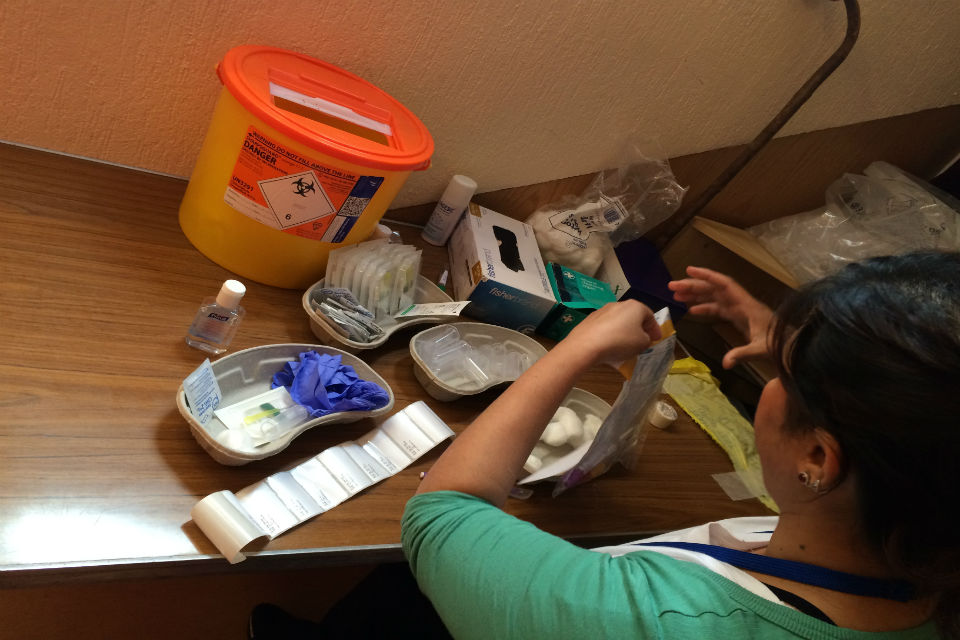Department of Health and Social Care
|
|
New approach to engaging rough sleeping and homeless community
PHE and local partners encouraged the rough sleeping/homeless community to attend a TB screening session by offering a wider range of services at the event.
Summary
Public Health England South West coordinated a multi-intervention day with local healthcare providers, charities and services to provide TB screening for the rough sleeping/homeless community.
In addition to the screening, partners came together to extend the breadth of the event to include a wide range of other services – Hepatitis B, C and HIV, substance misuse, mental health services and GP services and housing support.
Preliminary results show that over half of the homeless and rough sleeping community were reached, a fantastic result for a community that is normally under served or hard to engage with.
What was involved
Public Health England led the coordination of a multi intervention day to include a TB screening session aimed at the homeless/rough sleeping community in Bournemouth, Christchurch and Poole.
The initial motivation for the event came after one rough sleeper with infectious lung TB had been on the streets of Bournemouth during much of 2018 and was known to have spent a substantial amount of time close to other homeless people.
In normal circumstances, TB screening would be offered to those people most likely to have been in close prolonged contact with this person. However, the team felt that this could provide a great opportunity to offer a range of health and social care services to a wider group of highly vulnerable people.
Once the idea was raised to broaden the intervention, there was a fantastic response from commissioners and health care providers from multiple agencies across Dorset. The event took two months from the first meeting to event day.
Agencies involved in planning the day and providing the services included:
- East Dorset TB Service (Royal Bournemouth and Christchurch Hospital [RBCH])
- RBCH Hepatology Service
- the Homeless HealthCare Service
- a local GP
- Addaction (a substance misuse treatment and support service)
- the Dorset Blood Borne Virus Service
- St Mungo’s
- BH1 Project
- the Salvation Army
- local church groups
- Public Health England
- Public Health Dorset
- BCP Council
- NHS Dorset Clinical Commissioning Group (CCG)
Services provided
A mobile chest X-Ray van (from NHS Find and Treat) parked outside the Salvation Army building where the event was held. The van was the first stop for the clients, from where they could receive immediate results of their X-Ray. They were then encouraged to go into the building where the other services were available.
Clients had access to blood tests for TB, hepatitis B, hepatitis C and HIV, a mouth swab for hepatitis C (with immediate results and, if positive, the offer of a liver scan), registration and/or consultation with a GP, consultation with mental health services, substance misuse services and housing advice.
Free food and drink and a comfortable place to sit and talk was also available to them once they had had their chest X-ray and/or blood tests.

Results
The event was a huge success, far exceeding our expectations of a turn-out of 30 to 40 people.
In fact, people queued for most of the day – around 140 people attended:
- 138 people had chest X-rays (of which at least 12 had abnormalities identified and were referred for follow up)
- 86 people had blood tests
- several people were given and trained in the use of naloxone (an antidote to heroin overdose)
- 1 person with acute psychosis was referred to mental health services
- 3 rough sleepers were allocated housing
- many people accessed services that they would not otherwise have accessed
We are still collating the final outcomes.
What worked well
The familiarity of the venue
The event was hosted by the Salvation Army in Boscombe, opposite the BH1 Project – both are well known to the rough sleeping community who regularly use them for daytime shelter, access to washing facilities, food, advice and other drop in clinics.
Getting the message out to clients
The planning team gave a TB education session to local outreach workers to raise awareness of TB and the forthcoming event. The outreach workers were fantastic in getting the message out through their network using word of mouth, posters and cards that the planning team had prepared.
Transport
We were also fortunate enough to have the use of a minibus kindly donated by a local church, which was used to ‘round up’ our target population from local drop in centres, support groups, hostels and the streets.
Feedback showed
Clients were very grateful for the event. Comments included: “spot on”, “well organised”, “very supportive” and “thanks for caring about us”.
We also had some great comments from the service providers such as:
- “This is a fantastic example of multi-agency working”
- “It was a fantastic client focused event which surpassed many of our expectations. I found it particularly encouraging to see what can be done with the resources we already have when supported to work together”
- “It was a pleasure to be involved and work alongside everyone involved, so thank you for inviting me to be a part of this excellent initiative”
The overriding feeling was “when can we do it again?”
All agencies worked together both in the planning and on the day and there was a strong recognition that multi-disciplinary “hub” style working is vital to support these vulnerable clients and the fact that agencies were able to cooperate and work across organisational boundaries was refreshing.
Next steps
The local team have applied for a share of a PHE fund aimed to help the homeless and rough sleeping community and these partners have all expressed a desire to do this kind of working again.
Related content
Collection
Original article link: https://www.gov.uk/government/case-studies/new-approach-to-engaging-rough-sleeping-and-homeless-community


